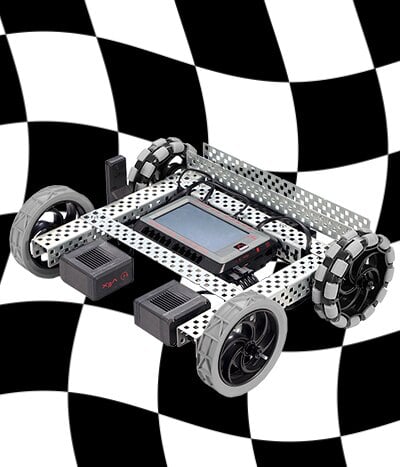Robo Rally Preview
- 12 - 18 years old
- 45 minutes - 4 hrs, 35 min
- Beginner

Description
Students are asked to use proportional reasoning and scale to design a racecourse for the Speedbot.
Key Concepts
-
Mathematical Reasoning
-
Proportional Reasoning
-
Iterative Design
Objectives
-
Create a racecourse by planning with scaled drawings.
-
Analyze relationships between scaled measurements.
-
Practice converting units.
-
Understand the use of scales and proportional reasoning.
Materials needed
-
1 or more VEX V5 Classroom Starter Kits
-
Roll of Tape
-
Meter Stick or Ruler
-
Calculator
-
Engineering Notebook
-
Stopwatch
-
Multiple boxes
-
3-Ring Binders
Facilitation Notes
-
Ensure all required parts for the build are available prior to starting this STEM Lab.
-
Although the V5 Robot Brain is included in the build of the VEX V5 Speedbot, no programming is required.
-
Make sure that there is ample space in the classroom to measure out and tape the field area for the racecourse that will be used.
-
Providing a set space to create a racecourse within can help expedite initial decisions for the design area.
-
An engineering notebook can be as simple as lined paper within a folder or binder. The notebook shown is a more sophisticated example that is available through VEX Robotics.
-
During the iterative design process prior to the challenge, teams should be testing the accuracy of their measurements and mathematical conversions.
-
The approximate pacing of each section of the Stem Lab is as follows: Seek- 125 minutes, Play- 85 minutes, Apply- 15 minutes, Rethink- 45 minutes, Know- 5 minutes.
Further Your Learning
Math
-
Add other items to the physical racecourse, based on scale. Some items could include, stands, a press box, concession stand, trees, benches, etc.
-
Draw a map of the school campus or other well-know location in the school community with the correct scale.
Social Studies
-
Look at various maps to compare the scales used. Have the students create their own set of questions and then trade with each other to solve.
-
Research how cartographers use technology to help create more accurate maps.
Educational Standards
Standards for Technological Literacy (STL)
-
4.E
Next Generation Science Standards (NGSS)
-
HS-ETS1-2
-
HS-ETS1-3
Common Core State Standards (CCSS)
-
RST.9-10.3
-
RST.11-12.3
-
HSN.Q.A.1
-
HSA.CED.A.1
-
MP.4
-
MP.5
-
MP.6
-
CCSS.MATH.CONTENT.6.RP.A.1
-
CCSS.MATH.CONTENT.6.RP.A.3.D
Texas Essential Knowledge and Skills (TEKS)
-
126.40.c.1
-
111.39.c.1